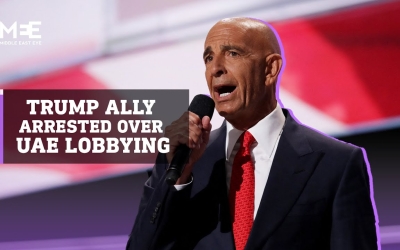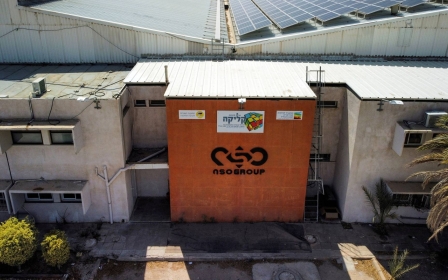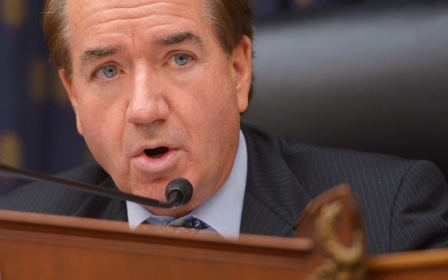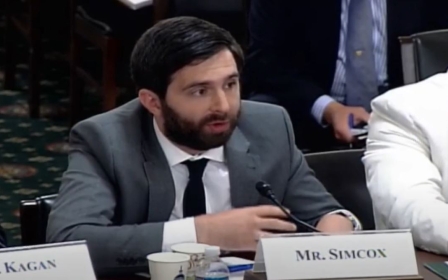US legislation seeks to target foreign funding behind congressional testimony
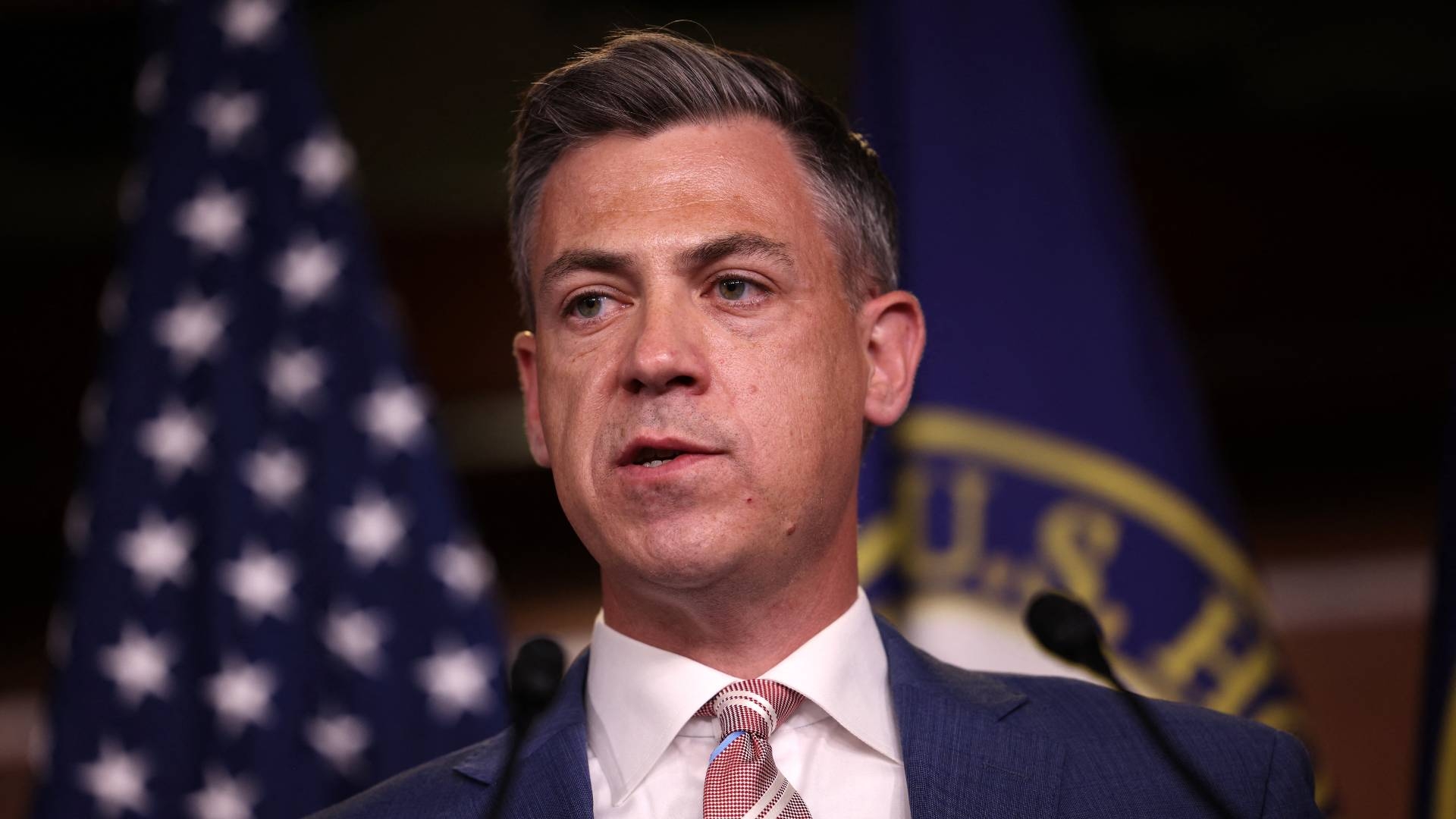
A newly introduced bill in the US Congress is seeking to close a longstanding loophole and require experts giving congressional testimony to disclose foreign contributions that their employers receive.
The legislation could have an impact on funding to American think tanks by governments in the Middle East, including countries such as the United Arab Emirates, Qatar and Morocco, which have donated millions of dollars to such institutions in recent years.
The bill, introduced by Republican Congressman Jim Banks on 18 November, seeks "maximum transparency so Congress and the American public understand exactly how foreign agendas may be influencing the public policy discussion that takes place before House committees", according to a summary of the resolution.
Scholars from think tanks and research institutes are often called upon by Congress to provide testimony as experts in their fields, from issues ranging from housing policy to developments in the Middle East.
While current rules in the House state that witnesses testifying during hearings must disclose their organisation's ties to funding from abroad, Banks' legislation would go one step further.
It would remove a rule that allows witnesses to hide those ties by testifying in an individual capacity.
"When Congress hears testimony from individuals, Congress itself often doesn't know about the potential conflicts of interest those witnesses might have," Ben Freeman, director of the Foreign Transparency Initiative at the Center for International Politics (CIP), told Middle East Eye.
A congressional aide told MEE that "members of Congress do better when they're fully informed".
The aide added that experts' ties to foreign funding "may not always be information that is readily available to members of staff".
"[Banks] want to make that a little bit more readily available. Just so we know before these foreign policy experts come, just what all their motivations are for their testimonies."
'Potential ramifications'
A report last year by the CIP found that more than $174m in foreign funding was donated to 50 of the top US think tanks.
A separate report by The New Republic found that out of a total of 70 witnesses who testified before House committees in 2021 and were linked to one of the think tanks the CIP identified as having received foreign government funding, only 14 testified on behalf of their organisations.
The CIP report also found that several Middle Eastern countries were among the top foreign donors to Washington-based think tanks.
The UAE and Qatar were among the top ten countries donating to these institutions, donating $15.4m and $8.5m respectively, according to the report. Morocco, meanwhile, was included in the top 20 countries with donations totalling $2.8m.
But according to the report, the donations did not provide the full picture, with the study noting that many of these countries had provided money to think tanks not listed in the top 50.
"There's so many different potential ramifications, largely because there are so many think tanks that have foreign funding," said Anna Massoglia, an investigative researcher on foreign influence at OpenSecrets.
"I don't know if it's been fully realised how many of the think tanks that currently have individuals, consultants or experts that testified before Congress" have received funding from foreign governments, she told MEE.
MEE reached out to the embassies of Morocco, Qatar and the UAE to ask how this bill might impact funding towards US-based think tanks, but did not receive a response.
The bill follows a growing movement in Congress to combat what lawmakers argue is Chinese government influence in their legislature.
Earlier this year, the Senate Foreign Relations Committee advanced legislation aimed at combatting China's ambitious Belt and Road Initiative.
Congressman Banks, who is a member of the House China Task Force, introduced five bills aimed at countering Beijing, including one that would restrict foreign students from working on programmes funded by the Pentagon, the Department of Energy, and the US intelligence community.
"This is kind of in line with that project, which is to curtail the Chinese Communist Party's attempts to influence and subvert American lawmakers," the congressional aide said.
'Positive impact'
Congress has been working for years to create more transparency in Washington. In 1997, the House first introduced the Truth in Testimony resolution as a Republican effort to identify whether witnesses in congressional hearings received any federal funding.
Then, decades later in 2015, Congress amended the rule to include foreign government funding, following an investigation by The New York Times that found 64 foreign governments, entities, or officials donated at least $92m to 28 major think tanks in the US over a four-year period.
Freeman said he believed the latest bill was "going to have a very positive impact on think tanks that accept funding from countries in the Middle East because it's going to level the playing field when it comes to transparency".
While he noted that many institutions have already been transparent about their funding, such as the Brookings Institution, many others are currently in the dark about whether they receive money from abroad.
'This is a loophole that should be closed'
- Meredith McGehee, an expert on Congress, lobbying and ethics
"I think there's got to be a push for think tanks that don't already disclose this information to go ahead and, in anticipation of testifying, make it publicly available on their website. Be open and honest about it," Freeman said.
"And then that way when their scholars do go to testify, it won't be so great a surprise that they are taking money from the UAE, Qatar, Turkey or whatever country they're receiving money from."
While experts noted that the new resolution could have a positive impact overall, it could also force certain experts to shy away from appearing in Congress.
"I would expect right now there are probably some foreign entities or foreign individuals that are more than happy to keep their identity out of the public eye," Meredith McGehee, an expert on Congress, lobbying and ethics, told MEE.
Ultimately, however, she said that "this is a loophole that should be closed".
"If someone is testifying before Congress, in that case, if you do a cost-benefit analysis, the benefit of transparency is much greater than the cost to being able to hide who is subsidising your work."
Middle East Eye delivers independent and unrivalled coverage and analysis of the Middle East, North Africa and beyond. To learn more about republishing this content and the associated fees, please fill out this form. More about MEE can be found here.


